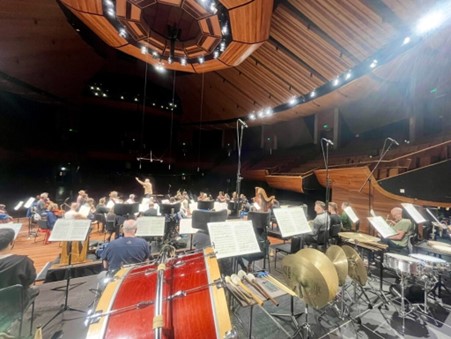 New Zealand Shostakovich, Tchaikovsky, Rimsky-Korsakov: Jian Liu (piano), Orpheus Choir of Wellington (Director: Brent Stewart) and Orchestra Wellington (Concertmaster: Amalia Hall), Marc Taddei (conductor). Michael Fowler Centre, Wellington, New Zealand, 7.6.2025. (PM)
New Zealand Shostakovich, Tchaikovsky, Rimsky-Korsakov: Jian Liu (piano), Orpheus Choir of Wellington (Director: Brent Stewart) and Orchestra Wellington (Concertmaster: Amalia Hall), Marc Taddei (conductor). Michael Fowler Centre, Wellington, New Zealand, 7.6.2025. (PM)

Shostakovich – Symphony No.2 in B Major, Op.14 ‘October’
Tchaikovsky – Piano Concerto No.3 in E-flat major, Op.75
Rimsky-Korsakov – Scheherazade, Op.35
Here was sensation aplenty for any Wellington concertgoer – an Aotearoa New Zealand premiere of a symphony by a composer in his 50th anniversary year, actually the second of a series of concerts featuring a cumulative retrospective of Russian composer Dmitri Shostakovich’s coming of age as a composer, with the latter blissfully unaware at that time of the threat that was to emerge from what became the disturbingly unpredictable strictures of an authoritarian government.
This presentation was a task obviously relished by the brilliantly eager Orchestra Wellington, its inspirational music director Marc Taddei, and the voices of the prestigious, long-established Orpheus Choir, all ready to play their part in turning the symphonic page on what was to be, in a distant land, a new world of government – at that stage a world still filled with hope and promise!
Though taking us backwards in time, the concert highlighted for us a mini-symposium of trends from a distant musical world which had produced some of its most exotic and brilliant masterpieces. Certainly Nikolai Rimsky-Korsakov’s Scheherazade could have been regarded as a jewel in the crown of Russian Romanticism, featuring the inescapable influence and lure of the east for a whole coterie of creative artists of the time. And at another end of a spectrum was the more cosmopolitan Pyotr Tchaikovsky, avowing himself to be as Russian as anybody else, but mindful of western influences and distrustful of any rabidly nationalistic artistic ideas or credos.
Rimsky-Korsakov’s evergreen masterpiece was here graced by the arresting characterisation of the work’s eponymous heroine from solo violinist Amalia Hall, the orchestra’s concertmaster, her playing as silvery-toned and singularly engaging as one would wish, the perfect foil for the orchestra’s vividly-projected scenarios of oriental fantasy refracted through the storyteller’s beguiling invention and power of personality. From the opening interplay between the aggrieved, vengeful Sultan’s baleful utterances and the outwardly unperturbed Scheherazade’s disarming rejoiners, right through to the by-then desperate storyteller’s evocation of the spectacular destruction of Sinbad the Sailor’s ship’s in a storm at sea, we revelled in conductor Taddei’s and the orchestra’s unfolding of the overall drama through to its blissful conclusion.
So to Tchaikovsky’s Third Piano Concerto, one long been regarded by many as a ‘Cinderella’ work compared with its two glamorous older sisters! However, as was proven here, a truly committed performance belies its composer’s own poor opinion of what was completed of the work (mainly its first movement) and makes a properly resonating case for its position in the established order of things. With recent award-winning pianist Jian Liu at the keyboard helm (‘Best Classical Artist’ in Aotearoa’s recent 2025 Music Awards) the most persuasive case possible was made by soloist, conductor and players via their full-blooded response to the music’s colours, trajectorial energies and volatile interplay between piano and orchestra. And Liu’s offering as an encore one of the composer’s most attractive excerpts – ‘Autumn’, from his solo piano work ‘The Seasons’ (known as ‘The Months’ in some quarters) – put the cap on what was perhaps the evening’s most unexpectedly delightful sequence of presentation.
No-one would have ascribed ‘delight’ as a foreseeable reaction to the Shostakovich Symphony No.2 with which Taddei opened the programme, but its impact, right from the work’s beginning, was considerable in its ‘charged quietude’ – more a subterranean rumbling than music at first, with the bass drum showing the way to the lower strings whose murmurings coalesced into an extraordinary sotto voce hive of activity as section after instrument quietly entered the fray, with only the trumpet waving a kind of thematic flag atop of the constrained confusion!
A dancing rhythm sprang from the lower strings, its trajectories spreading through the orchestra like a madcap danse macabre, capped off by a fusillade of percussion and a scintillating wave of impulse which, exhausted, was picked up again by the solo violin and turned into an amazing fugal passage sweeping onwards and morphing into a kind of Movietone News fanfare – outrageous but mesmerising! At its conclusion anything could have then happened – we seemed almost all like potential players in a game waiting to be told our next move – was this perhaps what one felt when attending a stateside Trump rally?
Into the void came a crashing volley of percussion and a factory siren! Amid the sudden exhilaration, the waiting Orpheus Choir leapt to its feet and began to intone the words of a poem glorifying Lenin and socialism (thankfully in Russian!) Not being able to understand a word until looking up the translation afterwards, I was visited by the impulse to interpret the dreadfully banal texts at the time as reflecting the nobility and forthright optimism of the choral tones in Beethoven-like terms! Add heroic brass calls decorated by winds and punctuated by a cymbal crash, and you have a full orchestral panoply to help the voices celebrate whatever! Even the ‘shouting rather than singing’ passages added to the festive ethos of the occasion, taking it all beyond platitudinous dogmas and into more uplifted realms of the human spirit – a moment to remember and treasure!
Peter Mechen
